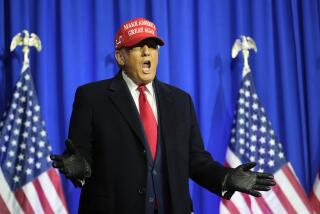U.S. to Urge End to Steel Trade Barriers
The United States will propose the elimination of international steel subsidies and trade barriers during talks this week in Paris, a senior Commerce Department official said Monday.
The four-point plan comes just six months after President Bush slapped hefty tariffs ranging up to 30% on U.S. steel imports to help domestic firms get back on their feet after a string of bankruptcies.
At the time, the Bush administration said 50 years of government subsidies for steel worldwide were partly to blame for conditions faced by the U.S. steel sector.
The U.S.’ trading partners criticized it for the steel tariffs, which they said violated World Trade Organization rules. But the Bush administration said the action was legal under WTO “safeguard” provisions, which allow countries to take temporary action against imports to give domestic firms time to become more competitive.
The Commerce Department official, who spoke on condition that he not be identified, said the U.S. would outline its ideas during talks that begin Wednesday in Paris under the Organization for Economic Cooperation and Development.
The Commerce Department official rejected suggestions that the U.S. tariffs would make trading partners less receptive to its idea.
The U.S. plan calls on countries to agree to “prohibit substantially all subsidies to the steel sector,” with the possible exception of money spent to eliminate excess production capacity and retrain workers, the official said.
It also calls on countries to agree to eliminate all tariffs and other barriers that “have a dampening effect on trade,” the official said.
In a third area, the U.S. proposal calls for improved enforcement of domestic competition laws so that steel markets “are allowed to operate fully,” he said.
The proposal also calls for action on practices including government credits and other forms of preferential financing for steel firms, as well as bankruptcy procedures that allow inefficient facilities to continue operating.
But the U.S. said it opposed industry-specific talks on safeguard duties such as those Bush imposed or anti-dumping and countervailing duties used by the U.S. on foreign steel products.
More to Read
Inside the business of entertainment
The Wide Shot brings you news, analysis and insights on everything from streaming wars to production — and what it all means for the future.
You may occasionally receive promotional content from the Los Angeles Times.










